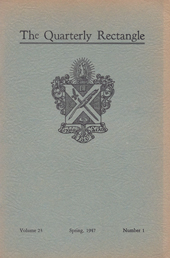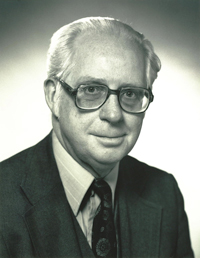Sigma Tau Delta at 90: Kulturgeschichte

"Kulturgeschichte" is a word to describe the cultural history of something by examining past knowledge, narratives, and traditions. It is pronounced as kul·tur·ge·schich·te. Make sure to gargle the "kul" at the back of your throat and say "schichte" as though you are sneezing.
Go ahead. Give it try.
. . .That's right. Bless you.

The Rectangle, Spring 1947
As I reflect on the 90th Anniversary of the International English Honor Society, I wanted to write about the rich history of the organization. Kulturgeschichte was the best word I could find to capture what makes Sigma Tau Delta special. The Society's exceptionality is so much more than achievements and dates. Rather, it's also the people, the stories, and the unofficial traces of a dynamic and thriving organizational culture. Although many people view the word culture as a simple descriptor for various values and traditions, the concept of culture is far more inclusive than that. Culture is learned, and the culture of a society shapes the behaviors and consciousness of its members. Sigma Tau Delta has its own culture; a culture characterized by student-centered philosophies, supportive camaraderie, and vibrant academic achievement.
As the historian for the last eight years, I had the pleasure of contributing to the cultural preservation of Sigma Tau Delta by reviewing and cataloging more than a thousand documents, publications, and eclectic ephemera. I learned much. Sigma Tau Delta was founded in 1924 by Judson Q. Owen at Dakota Wesleyan University. The year 1924 was a year of new ideas, innovation, and possibility.
Since its inception, Sigma Tau Delta has modeled its mission to confer distinction for high achievement, promote interest in English language and literature, foster exemplary character and fellowship, and exhibit high standards of academic excellence. To that end, from 1924-1970 Sigma Tau Delta established an advisory cabinet with elected officers; subdivided the geographic regions; published The Rectangle two-three times per year; held triennial conventions (The first convention program was a single sheet of paper!). While regional conventions gained strength during this time period, the national conventions lapsed from about the mid-1930s through the early 1970s.

Dr. E. Nelson James
From 1970-1982, Dr. E. Nelson James took the reigns as the executive secretary after Owen's death in 1969. James facilitated a reorganization of the society by moving the central office to Northern Illinois University, substituting the Advisory Cabinet with a Board of Directors, and developing a working constitution. The national convention was reestablished in 1970 as a biennial event; The Rectangle was maintained as a semi-annual publication; and in 1972, Sigma Tau Delta was accepted as a member of the Association of College Honor Societies. In 1982, Dr. William C. Johnson was appointed as Owen's replacement as executive secretary with his title being changed to Executive Director in 1988. Under Johnson's leadership from 1982-1990, the organization grew to include more than 400+ chapters and became an international English honor society.
Since 1990 to present day, Sigma Tau Delta has continued to flourish. In 1996, Sigma Kappa Delta was founded for the growing two-year college system, and in 2004, the National English Honor Society was established for high school students and faculty. The conventions became annual events in 1994, and the event locations moved from college campuses to larger venues and hotels. The Rectangle became an annual publication, and The Sigma Tau Delta Review, a journal of critical writing, was added as a societal journal in 2007. Sigma Tau Delta moved into the information age with the creation of a new website, online submissions, and social media in the form of blogs and tweets. Currently, the society serves over 850 chapters located in the United States and abroad; there are more than 1,000 faculty Sponsors, and approximately 9,000 members are inducted annually. It is now the second largest honor society in the world.
Okay. So, it's hard to get away from the impressive, yet mind-numbing facts, but what the official history doesn't say is that during Sigma Tau Delta's growth there was a purposeful burning of societal documents by an angry spouse, inspirational Pulitzer-prize winning authors, bawdy limericks, curious board member theatrics, record-setting book signings, a political coup, a public case of plagiarism, bad poetry contests, much laughter and some questionable dancing. I can't detail the stories here, but if you meet me in the hotel lounge at the Albuquerque convention, I have some tall tales I can share.
These details provide just a few highlights from Sigma Tau Delta's memorable history, its kulturgeschichte. By all means, laud the societal kulturgeschichte, and don't forget to say it with a gargle and a sneeze.
Sources:
Sigma Tau Delta Archives
History Orb



